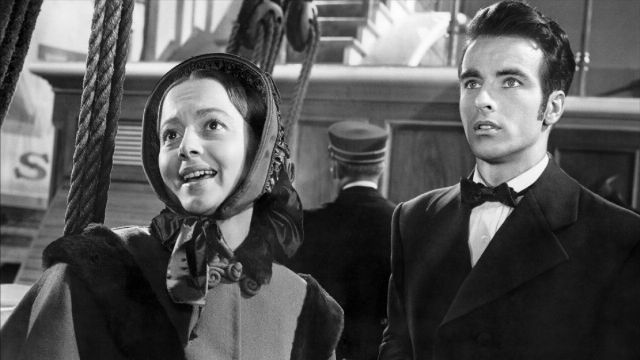The Heiress (1949) 
“When a Woman Loves a Man . . . She Doesn’t Want to Know the Truth About Him!”

Director: William Wyler
Cast: Olivia de Havilland, Montgomery Clift, Ralph Richardson
Synopsis: A young naive woman falls for a handsome young man who her emotionally abusive father suspects is a fortune hunter.
A romantic drama set in 1840s New York’s polite society, The Heiress is the type of movie that fails to appeal to many people. I’ve got to admit, I wasn’t thrilled with the prospect of sitting through this one, even though I’ll pretty much watch anything that’s ever played in a movie theatre and was fully aware of the reputation it had as one of Hollywood’s classics. I’m glad I gave it a go, though, because The Heiress remains a compelling and powerful movie more than 60 years after its initial release.
Olivia de Havilland plays Catherine Sloper, the daughter of Austin Sloper (Ralph Richardson) a successful and wealthy doctor. Sloper is widowed. He seems a little haunted by the memory of his wife, and unfairly compares Catherine to her a little too often for comfort. Catherine is a little on the plain side, you see — although seeing as how she’s played by de Havilland, it’s never difficult to spy the swan lurking beneath the ugly duckling facade. She’s also shy and awkward, and lacks the social skills necessary to become a desirable target in New York society. De Havilland is superb in a role that demands perfection if it is to be believable. She transmits Catherine’s awkwardness and nerves in shy, darting glances and passive body gestures (just look at how she leans away from the handsome Morris Townsend (Montgomery Clift), the only man to ever show an interest in her).
The one thing Catherine does have in her favour is an annual income of $10,000, which will rise to $30,000 upon her father’s death. Although her upbringing by Sloper and his unthinking — and occasionally unintentional – harshness towards her — reveals his constant disappointment with her, you sense that he loves his daughter and feels the natural paternal urge to protect her. Or, then again, perhaps he just refuses to believe that a handsome young man like Townsend would take an interest in her. That’s the beautiful ambiguity about the way The Heiriess is written (by Ruth and Augustus Goetz) — like the other characters in the film, you can never be absolutely sure of anyone’s motivation or true feelings.
Either way, Sloper carries out some investigations into Townsend’s character with all the care and attention to detail of a surgeon wielding a scalpel, and doesn’t much like what he comes up with. Townsend’s a bit of a wastrel, it seems. He’s frittered away one small legacy — which he openly admits — on travel while his aunt struggles to make ends meet, and wears fine gloves despite being broke. Given Sloper’s opinion of his daughter’s hot-or-not rating, it’s hardly surprising that he comes to the conclusion that Townsend is nothing but a chancer out to snare himself a wealthy wife. Obviously, this comes as bad news for Catherine, who has naturally fallen head over heels for the first young man to ever show her even the slightest of attention.
The Heiress is based on a stage adaptation of Henry James’s novel Washington Square, but Wyler does a terrific job of helping us forget its stage origins. The strength of the material aids him also, as do performances from a cast at the top of its game — even though it was not an apparently happy set, with Richardson upstaging de Havilland with sly ad-libs, and Clift looking down somewhat arrogantly upon her style of acting. Clift was reported to have been unhappy with his performance, but he shouldn’t have been. In a mostly unsympathetic role, he manages to tread a very fine line so that we’re never sure of whether he’s showing emotional honesty or attempting to conceal a hidden agenda by using the ingenious tactic of being entirely honest about his failings.
The film’s ending is justly famous, and it’s refreshing to see a studio-era Hollywood picture that bucks the trend by refusing to bow to any pressure to tack on a happy ending that would have surely diminished all the good work that had come before. Leo Tover’s superb cinematography is also worthy of a mention.
(Reviewed 22nd February 2013)
httpv://www.youtube.com/watch?v=XBtIN2he4IE
